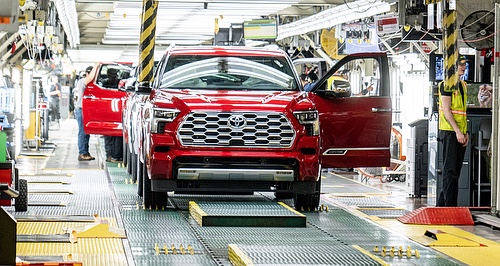News - Industry NewsTrump implements 25pc new vehicle tariffAll vehicles and vehicle parts imported into United States now subject to 25pc tariff28 Mar 2025 UNITED STATES president Donald Trump has implemented a 25 per cent tariff on all vehicles and vehicle parts manufactured outside of the country from April 3.
The new automotive tariff comes after the Trump administration implemented levies on Canadian and Mexican imports on March 4.
The new tariffs are described by Automotive News as a “major escalation” in the Trump administration’s trade agenda that could cause “massive ripple effects” throughout global automotive supply chains already reeling from other new levies, retaliatory measures, and a lack of long-term clarity on trade policy.
Automotive components including engines, transmissions, and powertrain and electrical components are also the subject of a 25 per cent tariff.
Tariffs on parts will go into effect from May 3, however parts that comply with the rules for tariff-free trade under the United States-Mexico-Canada Agreement (USMCA) will not be subject to the new duty until such time as the Commerce Department establishes a process to apply it only to the components’ non-US content.
The tariffs will only apply to the value of non-US content in vehicles imported from Canada and Mexico that comply with the USMCA’s rules.
“What we’re going to be doing is a 25 per cent tariff for all cars that are not made in the United States,” said Mr Trump.
“We start off with a 2.5 per cent base, which is what we’re at, and go to 25 per cent. This will continue to spur growth like you’ve never seen before.”
While Mr Trump says the tariffs are aimed at bolstering domestic manufacturing and incentivising vehicle manufacturers to move vehicle production to the United States, industry experts warn that broad-based tariffs could quickly lead to new-vehicle production cuts in North America, while raising new vehicle prices by “thousands of dollars”.
Anderson Economic Group chief executive officer Patrick Anderson told Automotive News the policy will likely send the price of new cars soaring, while impacting jobs across vehicle production sites across the United States.
“The president’s remarks suggest that automobile buyers, and automobile workers, are in for a shock starting in less than a month,” he said.
“Tariffs at these levels means cost increases of $4000 to $10,000 for most ‘American’ cars.”
Mr Anderson said the anticipated prices rises would have a “dramatic negative effect on car sales in the United States” and will “cause job losses in Michigan, Ohio, Indiana, Illinois, Missouri, Texas, South Carolina, and Alabama, as well as Ontario in Canada”.
He said manufacturers will attempt to substitute parts and shift production to avoid the impact of the levies but will also pass on tariff costs that “can’t be initially avoided” to dealers and customers.
But the United Auto Workers (UAW) has applauded the decision, calling it a “victory for autoworkers” and one that will put an end to what it describes as a “harmful economic framework”.
“We applaud the Trump administration for stepping up to end the free trade disaster that has devastated working class communities for decades,” said UAW president Shawn Finn.
“Ending the race to the bottom in the auto industry starts with fixing our broken trade deals, and the Trump administration has made history with today’s actions.”
The UAW called on vehicle manufacturers to absorb the costs of tariffs instead of passing them on to consumers, adding that it would support legislation requiring them to do so.
“Workers must be held harmless during any disruption that accompanies the reshoring process, with financial support from the federal government, if necessary,” the UAW said in statement.
Mr Trump labelled the complex automotive supply chain, in which parts are shipped back and forth over borders multiple times before ending up in a finished vehicle, “ridiculous”, saying the implementation of tariffs will “lead to cars being made in one location” and winning $US100 billion ($A157.6b) in annual revenue for the US government.
In 2024, nearly half of all new vehicles sold in the United States were imported, including $474 billion ($A749.5b) worth of automotive components and $220 billion ($A349.5b) worth of passenger vehicles.
Canada, Germany, Japan, Mexico, and South Korea were the biggest vehicle suppliers to the United States in 2024.
Mr Trump has also threatened to place a 25 per cent levy on products from countries that import Venezuelan oil, adding that they would stack on top of existing tariffs. If implemented, that would raise the tariff rate on goods from China, the largest importer of Venezuelan oil, to 45 per cent.
Steel and aluminium imports are also subject to a 25 per cent tariff, as are certain products that are composed of those metals. Those tariffs also stack on top of existing levies.
 Read more25th of February 2025  Mini EV production under a cloudBritish production of Mini EVs in doubt as tariff debate forces change of plans10th of February 2025  EU-China tariffs threaten Cupra brandVW Group execs warn jobs, Seat and Cupra brands at risk unless EU-China tariffs cut31st of January 2025  Trump tariff threats rattle EU automakersTrump’s proposed tariffs stand to hit exposed EU automakers6th of October 2024  EU votes yes to Chinese BEV tariffsFollowing a somewhat divided vote, the EU presses on with Chinese BEV tariffs |
Click to shareIndustry News articlesMotor industry news |
















Facebook Twitter Instagram